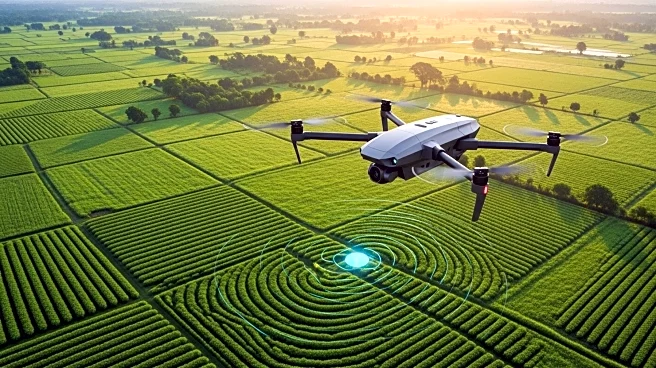What is the story about?
What's Happening?
The U.S. precision farming market, currently valued at USD 2,615.0 million, is expected to grow to USD 4.54 billion by 2030, according to DataM Intelligence. This growth is driven by the increasing adoption of Internet of Things (IoT) technologies and advanced analytics, which enable farmers to optimize labor, time, and resources within sustainable farming frameworks. Precision agriculture aims to boost yields, reduce costs, and ensure environmental compliance. The market is characterized by hardware innovations such as GPS, GIS, sensors, controllers, and advanced monitoring systems, with drones and automation solutions enhancing operational efficiency. The Northeast region shows strong adoption rates due to modern infrastructure and large-scale farm operations, while technological acceptance is spreading nationwide.
Why It's Important?
The expansion of the precision farming market signifies a shift towards more sustainable and efficient agricultural practices in the U.S. By leveraging IoT and analytics, farmers can make data-driven decisions that improve crop yields and reduce environmental impact. This growth is crucial for meeting the increasing demand for food production while addressing climate change challenges. The adoption of precision farming technologies can lead to significant cost savings for farmers and contribute to the overall economic growth of the agricultural sector. Additionally, the integration of satellite connectivity and UAV innovations can enhance rural coverage, further promoting the adoption of precision agriculture across diverse farming communities.
What's Next?
The precision farming market is expected to continue evolving with advancements in AI-driven forecasting and satellite-based connectivity for rural areas. Increased drone applications in farm analytics and automation for labor-strapped large-scale farms present significant opportunities for stakeholders. Companies like AGCO Corporation and Deere & Company are forming partnerships to enhance technology offerings, such as satellite connectivity, which will further drive market growth. As technology penetration deepens, precision agriculture is poised to become a mainstream practice, reshaping farming into a data-driven, high-output enterprise.
Beyond the Headlines
The growth of precision farming raises ethical and legal considerations regarding data privacy and the use of technology in agriculture. As farmers increasingly rely on data-driven tools, issues related to data ownership and security may arise. Additionally, the shift towards technology-driven farming could impact traditional farming practices and the livelihoods of smallholder farmers who may struggle to afford high-tech solutions. The industry must address these challenges to ensure equitable access to precision farming technologies.















